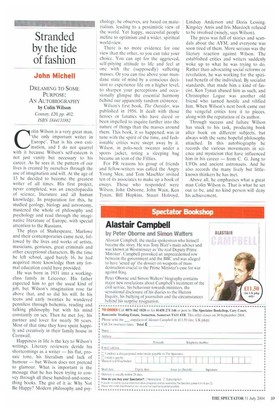Stranded by the tide of fashion
John Michell
DREAMING TO SOME PURPOSE: AN AUTOBIOGRAPHY by Colin Wilson Century, .C20, pp. 402, ISBN 1844131882 Colin Wilson is a very great man, 'the only important writer in Europe'. That is his own estimation, and I do not quarrel with it because Wilson's self-esteem is not just vanity but necessary to his career. As he sees it, the pattern of our lives is created by ourselves through the use of imagination and will. At the age of 13 he decided to become the greatest writer of all times. His first project, never completed, was an encyclopaedia of science, literature and all human knowledge. In preparation for this, he studied geology, biology and astronomy, mastered the whole of philosophy and psychology and read through the imaginative literature of Europe, with special attention to the Russians.
The plays of Shakespeare. Marlowe and their contemporaries came next, followed by the lives and works of artists, musicians, geniuses, great criminals and other exceptional characters. By the time he left school, aged barely 16, he had acquired more knowledge than any formal education could have provided.
He was born in 1931 into a workingclass family in Leicester. His father expected him to get the usual kind of job, but Wilson's imagination rose far above that, and so did his will. In his teens and early twenties he wandered penniless through bohemia, reading and talking philosophy but with his mind constantly on sex. Then he met Joy, his partner and lover for nearly 50 years. Most of that time they have spent happily and creatively in their family house in Cornwall.
Happiness in life is the key to Wilson's writings. Literary reviewers deride his shortcomings as a writer — his flat, prosaic tone, his literalism and lack of humour — but Wilson does not pretend to glamour. What is important is the message that he has been trying to convey through all these hundred-and-something books. The gist of it is: Why Not Be Happy? Modern philosophy and psy
chology, he observes, are based on materialism, leading to a pessimistic view of the world. Yet happy, successful people incline to optimism and a wider, spiritual world-view.
There is no more evidence for one view than the other, so you can take your choice. You can opt for the aggrieved, self-pitying attitude to life and feel at one with the (supposedly) suffering masses. Or you can rise above your mundane state of mind by a conscious decision to experience life on a higher level, to sharpen your perceptions and occasionally glimpse the essential harmony behind our apparently random existence.
Wilson's first book, The Outsider, was published in 1956. It dealt with those heroes or fanatics who have dared or been impelled to inquire further into the nature of things than the masses around them. This book, it so happened, was in tune with the spirit of the time, and fashionable critics were swept away by it. Wilson, in polo-neck sweater under a sports jacket, toting a sleeping bag became an icon of the Fifties.
For PR reasons his group of friends and fellow-writers was called the Angry Young Men, and Tom Maschler invited ten of its associates to make up a book of essays. Those who responded were Wilson, John Osborne, John Wain, Ken Tynan, Bill Hopkins, Stuart Holroyd, Lindsay Anderson and Doris Lessing. Kingsley Amis and Iris Murdoch refused to be involved (wisely, says Wilson).
The press was full of stories and scandals about the AYM, and everyone was soon tired of them. More serious was the literary reaction against Wilson. The established critics and writers suddenly woke up to what he was trying to do. Rather than advocating social reforms or revolution, he was working for the spiritual benefit of the individual, By socialist standards, that made him a kind of fascist. Ken Tynan abused him as such, and Christopher Logue was another old friend who turned hostile and vilified him. When Wilson's next book came out the vengeful critics tore it to pieces, along with the reputation of its author.
Through success and failure Wilson has stuck to his task, producing book after book on different subjects, but always with the same hopeful philosophy attached. In this autobiography he records the various movements in science and mysticism that have influenced him in his career — from C. G. Jung to UFOs and ancient astronauts. And he also records the many lively but littleknown thinkers he has met.
Above all, he emphasises what a great man Colin Wilson is. That is what he set out to be, and no kind person will deny his achievement.


























































 Previous page
Previous page